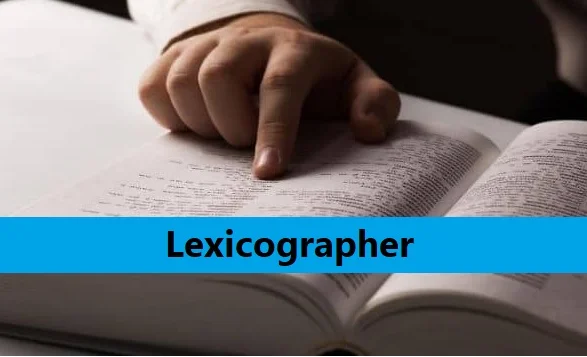How to Become a Lexicographer: Qualifications, Salary, Best Colleges List 2023

Lexicographers are the people who evaluate and update the definitions and meanings of words and phrases in dictionaries. There are two ways you might benefit from this career: either it will give you a new perspective on working with words, or it will provide you the experience you need to get into publishing.
Learning how to pursue this profession will also help you assess if this employment is the best match for you. In this post, we’ll explain what lexicographers do, go over the necessary procedures to get into the field, give you a rundown of relevant abilities, and go over data on wages and typical working conditions.
Who is a lexicographer and what is his job?
Dictionary entries are written and edited by lexicographers. It is their job to keep an eye on the English language and its evolution in order to produce timely revisions for both the web and print versions.
Words or phrases that are often used across several platforms, such as social media, might be included in this category. It’s possible that they’ll look at these sites and the word’s usage to see if it should be made official. Additionally, lexicographers can look into the etymology or definition of a term or phrase, as well as translate foreign words or phrases.
Check how to become a cost accountant
Qualifications needed to be a Lexicographer
To be a competent Lexicographer, you’ll need to have the following abilities:
- English fluency: It is essential for lexicographers to have a good grasp of English. Bilingual lexicographers who are fluent in both their native tongue and the target language have a keen awareness of and sensitivity to challenges related to translation. Language mechanics and the ability to use grammar correctly and spot typical problems in editing are critical.
- The Art of Making Complex Things Simple: A few words should be able to convey a complicated idea, and the English language should be used. Knowledge of how English is used in different English-speaking nations and the difficulties of learning English are essential skills for lexicographers, as are the ability to discern small changes in meanings.
- Having the Ability to Evaluate: Furthermore, they have a good sense of observation, which they employ to spot errors and inconsistencies in the way a presentation is put together and presented.
- Communication skills: To succeed in lexicography, you must be able to work well in a team and communicate well with others. While you must be able to concentrate and work well on your own, you will frequently interact with other editors and share ideas, as well as address difficulties on a formal and informal basis.
What does it take to become a lexicographer in 2023?
A bachelor’s degree is required.
A bachelor’s degree in English or linguistics is the best prerequisite for becoming a lexicographer. If you’re interested in improving your English understanding, enrolling in an English class will help you learn more about the language.
With the right training and experience, an education in another discipline may still be useful in the field of lexicography. Editing and copywriting abilities can be learned in the context of a communications degree. A candidate’s research abilities may be verified by an employer if they have a postgraduate degree.
Gain experience in a relevant field.
Gaining practical experience in a relevant sector is critical for putting your education to use and building a strong portfolio. Volunteering, interning, or participating in student work programmes are all viable options for gaining relevant experience.
If you want to improve your editing abilities, you can volunteer to be a teacher’s helper and check student work. Copywriting abilities can be improved through an internship with a magazine or newspaper publisher. Find out if there are any chances for you to use your abilities through your school’s student employment programme.
Create a repertoire of abilities
It is necessary to have particular qualities such as superior comprehension, reading, writing, and communication in order to work as a lexicographer. To succeed in this field, it’s important to identify the talents you’ll need and develop them early on.
Reading content on a variety of topics, for example, can help you enhance your understanding. A writing workshop may help you hone your talents, as can studying grammar and undertaking activities to sharpen your analytical and critical thinking abilities.
Check how to become a food inspector
Prepare a CV and a letter of introduction
Write a cover letter and a CV that highlights your relevant qualifications for the post. It’s crucial to show your attention to detail by submitting an error-free application for this position, which requires writing and editing abilities.
To learn more about what a firm is looking for when hiring, have a look at the job descriptions as well. A well-crafted cover letter might help you stand out from the competition. Mention the position you’re looking for in your cover letter and include a fact about the organization you love in your letter.
A genuine interest in the role and the firm may be shown by submitting a cover letter. An applicant tracking system will also accept your application if you incorporate keywords from the job postings in your application materials.
Apply for roles that are currently available
As soon as you finish your degree and obtain work experience, you may begin searching for employment and applying for them. To find out about employment openings, search job boards, visit business websites, and speak with people in your professional network.
A personal approach is the best way to find a job at a firm you’re interested in. Consider practicing your responses in mock interviews with family or friends to improve your chances of landing a job.
Keep in touch with the firms you applied for as well to see if your application has been accepted or rejected. You may show your commitment to the firm and the role by being persistent.
What is the Typical Salary for a lexicographer?
The average annual compensation for a lexicographer is $57,363, making them a technical writer. The location of your job, the organization you work for, and your level of experience all have an impact on your salary.
People with more education and/or professional experience, such as a master’s degree, can expect to make more money. Make note of the skills and education requirements for each position while you’re looking for new employment.
Where does a lexicographer spend most of their time?
For most lexicographers, a full-time job means working in an office all day and doing a variety of tasks. They frequently work on their own, but they may also assist in editing the work of others and working together on definitions. On a typical day, lexicographers could look up slang phrases in dictionaries, search the internet, and read popular culture.
Lexicography at the best colleges in India
It is possible to take lexicography classes taught in a variety of languages at a number of different educational institutions around the country. In order to enroll in a Master’s degree programme, a bachelor’s degree in the target language is required.
Several institutions have their own entrance tests for their master’s degree programmes. For lexicographers, completing a doctorate is seen as an additional qualification. Students who are interested in working in the publishing industry following the course have the option of interning at publishing companies.
There are the top institutes in India that give courses in lexicography and related areas:
| Colleges | Department |
| Deccan College in Pune | Department of Sanskrit and Lexicography |
| Punjabi University in Patiala | Department of Linguistics and Punjabi Lexicography |
| University of Madras | School of Tamil and Dravidian Languages |
| Central University of Kerala | Department of Linguistics |
| Bharathiar University | Bharathiar University’s Department of Linguistics in Coimbatore |
Career options for a Lexicographer
In order to generate dictionaries in print or online, lexicographers engage with a wide range of publishing companies. An editor or lexicographer can begin their career as either an editor or a junior editing assistant, both of which need a lot of experience in publishing. The number of senior and managing editor positions in lexicography is quite limited.
For the most part, this is office work. Many opt for freelancing or part-time work. Some of them go out on their own and start their own publishing firm. It’s possible that some people will choose to work in the sector and create or provide training. Lexicographers can enhance their professions by working on a variety of reference volumes. Lexicographers might be interested in the following:
- Oxford University Press
- Cambridge University Press
- Macmillan
- Harper Collins
- Macquarie
- Merriam-Webster
- Equinox Publishing
- Dictionary.com
On-the-job training is offered by some publishing companies to newcomers who are interested in creating dictionaries and e-books for the internet. This opens up a world of specialized lexicography applications and databases to the user.




